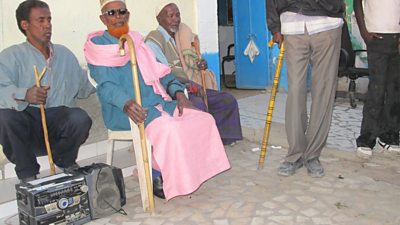I work with journalists who are brave individuals. They want the world to hear Somalia's stories.
Somalia has an international reputation as one of the world's most dangerous places for journalists. A history of prolonged conflict has led to widespread insecurity, with the region suffering lawlessness, a lack of infrastructure and resources and instability in government – and more recently a devastating famine.
The media has a prominent role to play in helping Somalis access and use information to engage in direct dialogue with local authorities, and empower marginalised sections of society to voice participate in public debate. There is a clear need to understand and support the media sector to help address some of the problems the country faces.
As part of a media development project undertaken in 2010-12, ����ý Media Action completed detailed research on the state and role of the media in Somali society. The project also trained journalists, senior editors and management staff at radio stations, and provided communications training for Somali civil society organisations, particularly those representing women and young people.
Danger zone
Somalia is undeniably a difficult place to be a journalist. Conflicting political pressures pose a threat to the production of unbiased news and self-censorship is rife. Press freedom monitors record alarmingly high incidences of intimidation of journalists, assaults and murders of journalists, seizures of assets and even closures of radio stations.
Despite this, there are a large number of media organisations operating in the three regions of Somalia, and the status of journalists among ordinary people is generally high. The research also found a high demand for news, and development-focused information amongst audiences.
Project co-ordinator, Diana Njeru, explained that there is a clear need for this kind of work:
"We train journalists to share information that offers hope at the end of a dark journey," she said.
"I work with journalists who are brave individuals. They want the world to hear Somalia's stories."
Sources of news
Radio remains the most dominant media in Somalia. Crumbling infrastructure following years of unrest has meant newspapers are almost non-existent in some regions, especially outside of urban centres. TV is growing in importance – the recent founding of TV stations by both the Transitional Federal Government and the Islamist militia group Al Shabaab reflect this – but access remains restricted.
New forms of communication such as mobile phones are increasing in popularity, particularly for personal communication. There could be potential for exploiting this for wider information and communication ends, although it remains largely unexplored.
A force for moderation?
The picture can be bleak, but a ����ý Media Action policy briefing based on the research findings argues that there is cause for cautious optimism. It argues that media could play a moderating role in Somalia.
The briefing explains that in the past the radio has been used to provoke tension, distrust and conflict as different warlords and clan leaders sought to control radio in their own interest. But, equally, media can be used as a force for good.
And with demand from ordinary Somalis for information they can trust and use, it is suggested that a supported media can contribute to greater stability in the region.
As Njeru says, "Somalis can feel forgotten and ignored but that doesn't mean they have given up hope".
"For too long [Somalia] has been left to its chaos, but now people are starting to dream of a better future" she adds.
